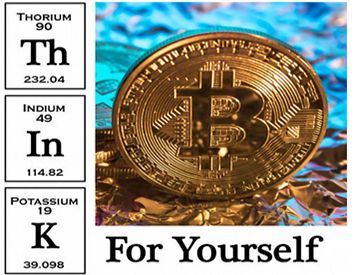From increased cybercrime to excess power consumption, cryptocurrency is adding to issues already faced by the worldwide web, writes Paul Budde.
I WOULD LIKE TO SHARE an article written by my Dutch friend and colleague, Fred Kappetijn.
In his younger years, the internet was a network of networks on which someone with a telephone connection, modem, PC, navigation and search program could visit places to find information, make transactions, exchange messages and entertainment.
One of the driving ideologies of this Web 1.0 was the democratisation of access to information. The idea was that if all citizens without technical and financial barriers have the same access to the desired information, they will have the same amount of knowledge and power. Very little has come of that ideal.
In the next phase of development of the internet, Web 2.0, the user was promoted from only passive consumer to also active producer of information and communication. Social media made its appearance. Thanks to services such as Facebook, Instagram, Twitter and many others, the internet would transform the world into a social mecca where all world citizens would communicate with each other as a large and lovingly operating family by emailing, texting and chatting.
But it went pretty wrong. Especially because of the possibility of (forwarding) anonymous and manipulated messages, the “social” media channels quickly degenerated into sewers full of indecent name-calling, taunting, disinformation and conspiracy theories.
Criminals also quickly discovered the attractive combination of accessibility and large scale, making the internet an unsafe environment for many people. On top of that, American technology companies saw their chance to hold users hostage and reduce them, unsolicited, to far-simplified and especially lucrative data profiles.
On Web 2.0, power is concentrated in the Big Five — Apple, Meta, Alphabet, Microsoft and Amazon. The powerlessness, vulnerability and dependence of the user are blistering. Fortunately, governments are now intervening.
This derailment of the internet through concentration of power is also the reason that decentralisation is the driving ideology behind Web 3.0, referred to as Web3. The decentralisation of information and transaction management can put power back in the hands of the user and can reduce the interference and control of governments and institutions such as banks and large internet companies.
The technical vehicle to achieve this is the blockchain. The rise of cryptocurrency with coins such as Bitcoin and Ethereum are good examples of the use of blockchain. This technique can not only ensure the decentralised management of money but also of all kinds of goods, information and outlandish new identities such as Non-fungible Tokens (NFTs).
Would the utopia of ultimate democratisation finally come true thanks to the Web3 version of the internet? Does Web3 guarantee the realisation of the ideal electronic environment for the world citizen yearning for independence and security? Or as some Web3 adepts say, “To lock people up in a more cooperative and less self-destructive society”.
I am afraid that human nature and the never infallible technology will lead to the outcome of the new salvific prophecy of the internet being disappointing this time, too. With Web 1.0, more access to information has not led to better dissemination of knowledge and power. With Web 2.0, the wide availability of communication services has not transformed the world's population into a cozy chattering village community overflowing with understanding, appreciation, inclusivity and cooperation.
How will it go at Web3? The first signs of the unrestrained progress optimism of Web3 are the sensitivity to fraud, the insanely high energy consumption and the rise of regulation and intermediaries that threaten independence and decentralisation.
In 2021, cryptocurrency crime achieved an 80 per cent growth compared to 2020. And then it's not just about pyramid schemes and Ponzi fraud cases where naïve, adventurous and money-hungry people lose a lot of money. According to the American blockchain data platform Chainalysis, in 2021, the size of cryptocurrency-based crime was more than $20 billion. That is not a small amount, but at the same time “only” a small part of the total transaction volume in 2021 of $23.5 trillion.
Chainalysis nevertheless states that the criminal use of cryptocurrency-based services is a serious problem. The fact that Web3 is a safe haven for thieves, money launderers and scammers creates huge barriers to the continued acceptance of Web3 and increases the need for governments to intervene and protect citizens.
Since last year, criminals with their long fingers cannot stay away from a new addition to the blockchain toolbox — the DeFi. A DeFi is a Decentralised Finance platform. The owners of these platforms use so-called smart contracts on a blockchain. Without being dependent on brokers, exchanges or banks, users make transactions with each other such as borrowing and speculating.
In doing so, they use derivatives and trade in cryptocurrencies, among other things. Some DeFi applications promise high-interest income, coupled with high risks. The total value of this form of decentralised financing now amounts to more than $298 billion. In 2021, somewhere between $2.9 billion and $14.9 billion were stolen.
Trading with cryptocurrency via, for example, DeFi, without supervision and control is very popular with persons and parties who have something evil in the sense such as money laundering or ordinary theft by hacking the sometimes poorly built smart contracts. A nice observation in this context is that “blockchains don't solve the human problem but they are decentralising it”.
In addition to the huge appeal to crooks, the blockchain has another additional serious problem, namely the gigantic energy consumption required for cryptocurrency transactions and blockchains in general. Due to the nature of decentralised information processing, many computers are stomping day and night and slurping electricity.
According to the Cambridge Bitcoin Electricity Consumption Index (CBECI), the global mining activities for the bitcoin use 120 terawatt-hours (TWh) annually. That is as much as the entire annual electricity consumption in the Netherlands. That is already an absurd fact and is only getting worse.
This development is at odds with combating the climate crisis and is, in my opinion, amoral. You can hardly expect someone to turn down the thermostat a degree when at the same time, the neighbour consumes an unimaginable amount of energy mining cryptocurrency.
The problems of crime and energy waste are forcing cryptocurrency developers and users to look for solutions. The irony is that these solutions can only be found in supervision and centralisation, thus destroying the two main pillars of the Web3.
Can and will Web3 and crypto humanise capitalism that has gone off the rails? It's a beautiful dream. Nevertheless, I fear that the internet is once again in danger of a rude awakening.
Paul Budde is an Independent Australia columnist and managing director of Paul Budde Consulting, an independent telecommunications research and consultancy organisation. You can follow Paul on Twitter @PaulBudde.
Related Articles
- World economies embrace benefits of digital currency
- The time to divest from Bitcoin is now
- The banking system putting pressure on consumers
- Think for Yourself: Cryptocurrencies
 This work is licensed under a Creative Commons Attribution-NonCommercial-NoDerivs 3.0 Australia License
This work is licensed under a Creative Commons Attribution-NonCommercial-NoDerivs 3.0 Australia License
Support independent journalism Subscribe to IA.
















